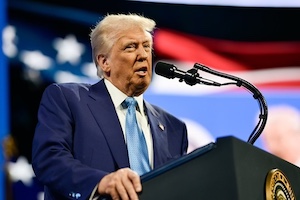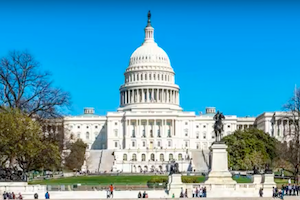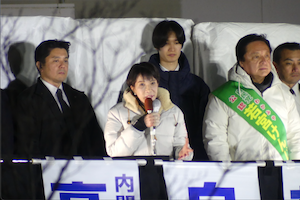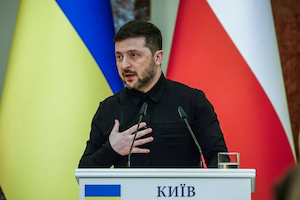World
Japan’s House of Representatives and House of Councillors Hold Prime Ministerial Nomination Vote: Sanae Takaichi Officially Reappointed

Japan’s National Diet convened a special session on the 18th, during which prime ministerial nomination votes were held in both the House of Representatives and the House of Councillors. With the ruling coalition holding a stable majority in both chambers, Sanae Takaichi secured more than half of the votes and was formally reappointed as Prime Minister of Japan.
In the House of Representatives vote, Takaichi received unified support from members of the Liberal Democratic Party and its coalition partners, winning by a clear margin over opposition candidates. The House of Councillors subsequently completed its own nomination vote, producing the same result as the lower house. Under Japan’s Constitution, if the two chambers select different candidates, the decision of the House of Representatives takes precedence. In this case, however, both chambers reached the same conclusion, allowing the procedure to be completed smoothly.
At a press conference following the vote, Takaichi stated that her administration would continue advancing policies on economic security, strengthening national defense capabilities, and prioritizing stability in people’s livelihoods and industrial development amid rising prices and shifting global conditions. She emphasized that Japan would deepen cooperation with its allies while maintaining regional peace and stability.
The prime ministerial nomination vote is widely seen as a renewed endorsement of Takaichi’s performance during her previous term. Analysts note that amid the interplay between domestic economic recovery and challenges in the international security environment, the policy direction and reform outcomes of the new cabinet will become key political focal points going forward.
- 1 read
The United Kingdom has confirmed that Russian opposition leader Alexei Navalny was poisoned to death.

On the 14th, the British government released the findings of its latest investigation, formally confirming that Russian opposition leader Alexei Navalny died two years ago as a result of deliberate poisoning. It further alleged that the operation was “highly likely” to have received support and authorization at the Russian state level. The conclusion is expected to further escalate already tense diplomatic relations between London and Moscow.
In a statement to Parliament, the UK Foreign Secretary said that, based on a comprehensive analysis by intelligence agencies and forensic experts, high concentrations of a nerve agent were detected in Navalny’s body. The substance was said to be similar to those used in several previous cases targeting dissidents. The statement emphasized that the evidence indicates this was not an isolated act, but rather an “organized and politically motivated assassination.”
Navalny had long criticized corruption within the Russian government and repeatedly publicly named and condemned President Vladimir Putin. He had previously been imprisoned and subjected to judicial pressure, and reports of his deteriorating health had surfaced multiple times. News of his death shocked the international community, prompting leaders and human rights organizations in various countries to call for an independent international investigation.
In response, the Russian side issued a statement through the Kremlin denying any involvement in the poisoning and criticizing the United Kingdom for making political accusations “without presenting concrete evidence.” Russia’s Foreign Ministry said the British claims were “groundless” and warned that it reserved the right to take countermeasures.
Analysts noted that if the UK releases more specific evidence or coordinates sanctions with its allies, it could trigger a new wave of diplomatic and economic confrontation. Several European countries have already expressed concern, urging that those responsible be held accountable while stressing the importance of protecting the safety of political dissidents.
The British government is currently coordinating follow-up actions with its allies, including possible asset freezes and travel bans. The international community continues to monitor developments closely, awaiting the release of further investigative details.
- 9 reads
Trump Pressures Iran as Two U.S. Carrier Groups Deploy; Military Action Reportedly Weeks in the Making
 U.S.
U.S.
President Donald Trump has once again issued a stern warning to Iran, applying pressure on both diplomatic and military fronts. Multiple international media outlets, citing U.S. officials, report that the United States has deployed two aircraft carrier strike groups to the Middle East and strengthened regional troop presence and air defense systems. Observers have described the move as a “dual-carrier show of force,” signaling that Washington’s dissatisfaction with Tehran has escalated into a new phase of confrontation.
According to reports, the United States Department of Defense confirmed it has ordered carrier strike groups, including the USS Dwight D. Eisenhower and the USS Carl Vinson, to operate in and around the Persian Gulf and the Arabian Sea, accompanied by guided-missile destroyers and submarines. At the same time, U.S. Central Command has raised the alert level at its bases in Iraq and Syria.
Officials in Washington told reporters that military preparations have been underway for several weeks, including precision-strike drills, logistics coordination, and consultations with allies. While the White House has not confirmed whether a specific timetable for military action has been approved, it stressed that “all options remain on the table.” Trump recently stated publicly that Iran would face “unprecedented consequences” if it fails to return to negotiations and agree to what he called a “fair deal” on its nuclear program.
Iran has responded sharply. Officials in Tehran accused the United States of escalating military intimidation and warned that any attack would trigger retaliation against U.S. bases and allied targets in the region. Iran’s Revolutionary Guard Corps has also announced a heightened state of readiness and conducted missile and drone exercises.
Analysts note that rising U.S.-Iran tensions are closely linked to developments in Iran’s nuclear program, attacks by regional armed groups on U.S. facilities, and security concerns in the Red Sea and the Persian Gulf. Although neither side has formally declared war, the scale and frequency of military deployments have heightened fears of a potential miscalculation.
The international community has urged restraint. Officials from the European Union and the United Nations reiterated that disputes should be resolved through diplomatic channels to prevent further instability in the Middle East. As U.S. forces continue to assemble and political rhetoric intensifies, developments in the coming weeks are likely to have significant implications for regional security and global energy markets.
- 13 reads
Turning the Tide in the Polls: Trump Makes a Sharp U-Turn on 50% Steel and Aluminum Tariffs

U.S. President Donald Trump signed an executive order in 2025 imposing a 50% tariff on steel and aluminum imports from around the world. The scope was expanded to cover 407 types of steel- and aluminum-derived products, including machinery, auto parts, and electronic equipment. However, according to media reports citing informed sources, Trump is planning to lower tariffs on certain steel and aluminum products in an effort to shore up declining approval ratings amid rising living costs.
A Reuters/Ipsos poll shows that 30% of Americans approve of Trump’s handling of rising living costs, while 60% express dissatisfaction. A survey released this month by the Pew Research Center indicates that about 52% of Americans believe Trump’s policies have worsened the economy. In addition, a report by the Federal Reserve Bank of New York finds that in 2025, approximately 90% of the economic burden caused by tariffs in the United States has been borne by American businesses and consumers.
Officials from the U.S. Department of Commerce and the Office of the U.S. Trade Representative stated that the steel and aluminum tariffs are expected to raise prices for various everyday goods, including baking trays and metal containers such as food cans, thereby harming consumer interests. Authorities are currently reviewing the list of products affected by the tariffs and plan to exempt certain items while postponing the expansion of additional tariff measures. Instead, they will initiate investigations targeting specific products.
Trump recently promoted his economic achievements in Detroit, highlighting his efforts to curb high prices. However, with the U.S. midterm elections approaching in November, concerns over inflation are weighing heavily on voters. As a result, the Trump administration may adjust its policies to win support, responding to mounting living costs and declining approval ratings.
- 27 reads
Instagram Accused of Luring Children Into Social Media Addiction; CEO Denies Allegations in Court

Media reports say that the CEO of Instagram (IG), Adam Mosseri, appeared in a California court in the United States on the 11th to testify, denying allegations that the platform may have lured users—particularly children—into addiction. The case stems from a complaint filed by a 20-year-old woman, Kaley G.M., who claims she became addicted to Instagram as a child, resulting in severe psychological harm.
According to the reports, Mosseri argued that a balance must be struck between safety and freedom of expression, and that Instagram is working to ensure safety while minimizing censorship. He also stated that when Kaley first used Instagram, the platform was smaller and posed a lower risk of addiction than it does today. Mosseri emphasized the importance of distinguishing between addiction and problematic use. For example, staying up late one night binge-watching a series on Netflix should not be considered an addiction.
The reports further note that Instagram and Facebook’s parent company Meta, as well as YouTube, owned by Google, are currently facing hundreds of lawsuits. They are accused of designing addictive content that harms young people, leading to depression, eating disorders, mental illness, hospitalization, and even suicide. Whether Instagram intentionally designed its platform to make children addicted could set an important legal precedent.
- 38 reads
2026 Munich Security Report Warns: Under Trump’s Leadership, the U.S. Has Become a Disruptor of the Global Order

The 62nd Munich Security Conference (MSC) officially released the “Munich Security Report 2026” on the 9th, under the theme “Under Destruction.” The report issues a stark warning about the shift in U.S. power politics since World War II, arguing that the world order is unraveling as a result. Large-scale disruption has become the norm, replacing the cautious reforms and policy adjustments of the past. In particular, under the leadership of Donald Trump, the United States has emerged as the most powerful “demolition man” within the existing rules and institutions, ushering the world into an era of “wrecking-ball politics.”
The multilateral institutions, economic openness, and human rights values long upheld by the United States in the postwar era have been abandoned in favor of an emphasis on “power and deals.” Wolfgang Ischinger, Chairman of the Munich Security Conference, stated that the shift in U.S. policy has made it “the elephant in the room,” exerting a profound and unavoidable impact on the global security system. European countries have begun to view the United States as a threat rather than an ally. Meanwhile, Washington’s inconsistent support for Ukraine, its conditional commitments to NATO, and its interest in Greenland’s territory and resources have further deepened Europe’s security anxieties. In addition, America’s wavering policy toward China and its harsh treatment of allies on defense spending and trade issues have triggered a serious “crisis of confidence” in the United States.
In 2025, the United States launched the so-called “Liberation Day” tariff war, severely damaging global trade and economic growth. The dismantling of the U.S. Agency for International Development (USAID) has also forced significant cuts or suspensions in aid to impoverished countries, potentially leading to an additional 14 million deaths by 2030. The report calls on rule-based democratic nations not merely to complain about the status quo, but to demonstrate political courage, strengthen cooperation among themselves, and invest in their own capabilities and resources. The future will depend on whether countries are willing to assume greater responsibility amid turbulence and work together to rebuild international consensus around trust and rules.
- 87 reads
The U.S. House of Representatives Passes the Taiwan Protection Act

On the 9th, the U.S. House of Representatives overwhelmingly passed H.R. 1531, the “Taiwan Protection Act,” by a vote of 395 to 2, formally establishing “economic sanctions” as a means to deter China’s military threats. The bill stipulates that if China’s actions pose a direct threat to Taiwan’s security, economic stability, or social system, the U.S. executive branch will be authorized to initiate procedures to sever China’s ties with key global financial systems such as the G20. The bill will now be sent to the U.S. Senate for a vote and will take effect only after being signed by President Trump.
The legislation, which enjoys strong bipartisan support, requires that if tensions in the Taiwan Strait escalate, the U.S. president must notify core financial authorities, including the Treasury Department and the Federal Reserve, and take “all necessary steps” to exclude China from six major international financial systems. Republican Representative Frank Lucas noted that the sanctions would include influential international economic and financial organizations such as the G20, the Financial Stability Board, and the Basel Committee on Banking Supervision.
Republican Representative French Hill stated bluntly that the enactment of this bill would ensure that if China launches aggression, it would have to bear extremely heavy economic and diplomatic costs, thereby establishing a substantive deterrent barrier. However, while demonstrating hard power, the bill also preserves diplomatic flexibility: if the president determines that implementing sanctions would harm U.S. interests, a waiver authority may be exercised.
Although the House has demonstrated strong resolve, the bill must still be passed by the Senate and ultimately signed by President Trump to become law. In the past, similar bills have passed the House but failed to receive a Senate vote. Whether this legislation can complete the process in the current Congress and be sent to President Trump for signature remains to be seen.
- 10 reads
Thai Progressive Party Set Back as Young Voters Lose Faith

Preliminary results of Thailand’s general election are in, showing that the progressive People’s Party—long the frontrunner in pre-election polls—won only 118 seats, far behind the conservative Bhumjaithai Party, which secured 193 seats. Bhumjaithai leader and incumbent prime minister Anutin Charnvirakul declared victory on the 8th, while the People’s Party conceded it would be unable to form a government. The outcome has surprised observers and left many young voters who had hoped for reform deeply disappointed.
As the successor to the Move Forward Party, the People’s Party carried forward a reformist and progressive agenda and enjoyed strong backing among younger voters. Opinion polls ahead of the election consistently showed the party in the lead, bolstering supporters’ confidence. The final results, however, delivered a decisive win for conservative forces. Many young people took to social media to express frustration and sadness, with some even saying they wanted to leave Thailand. Jednipit Jay Wongjedjan, 34, wrote on Facebook: “Since I turned 18, I haven’t seen any real change. How much longer do I have to wait?”
Pratsakun Cheepcheawcharnchai, president of the political science student association at Chulalongkorn University, said pre-election student surveys showed more than 60 percent of students were hopeful about the vote, making the outcome particularly shocking and disheartening. According to Thai PBS, as of 5 p.m. local time on February 8, Bhumjaithai had won 193 of the 500 seats in the House of Representatives, followed by the People’s Party with 118 seats and the Pheu Thai Party with 74. Official results are expected to be announced by April 9 at the latest.
- 29 reads
Experts Say Lower House Election Will Shape Japan’s National Security and Foreign Policy

In Japan’s House of Representatives election, the Liberal Democratic Party (LDP) led by Prime Minister Sanae Takaichi not only secured an outright majority on its own, but also surpassed the two-thirds threshold required to propose constitutional amendments, making Takaichi the biggest winner of the election.
In this round of Lower House elections, the LDP won a total of 316 seats, while the Japan Innovation Party, which forms a governing coalition with the LDP, captured 36 seats. Together, the two parties hold 352 seats—enough to independently initiate constitutional revision. Experts note that Japan will be compelled to seek a balance between stabilizing relations with China and strengthening the U.S.–Japan alliance, and that the election outcome will directly shape the country’s national security posture and foreign policy trajectory.
A public opinion poll released on January 24 by All-Nippon News Network showed that voters’ top policy priorities were responding to economic stagnation and rising prices, followed by pension and social security reform, and then diplomacy and national security. The results indicate that livelihood issues and security concerns have jointly emerged as central themes of the election. Within the U.S.–Japan relationship, security has consistently remained at the core, with debates extending to defense spending. In December last year, U.S. Secretary of Defense Pete Hegseth said Washington had asked allies including Japan to raise defense spending to 5 percent of gross domestic product (GDP) over the coming years. Tetsuo Kotani, a professor at Meikai University, noted that regardless of whether Japan fully complies, the U.S. demand will inevitably place heavy pressure on public finances and become an unavoidable issue within the U.S.–Japan alliance.
Kyodo News editorial board member Masahiko Hisae argued that regardless of which party is in power, Japan must confront the burden posed by a sharp increase in defense spending. He added that revising the three key national security documents could lead to controversial measures such as tax hikes, further intensifying domestic divisions, and that party positions on these issues would become an important reference for voters.
Naoyuki Hayashi, former political editor at Asahi Shimbun, said the distribution of seats in the House of Representatives will directly influence the direction and priorities of future policymaking. Many experts broadly agree that this election is not only about the structure of political power, but will also profoundly shape Japan’s future diplomatic and security strategy. The positioning of the U.S.–Japan alliance, the burden of defense costs, China policy, and how Japan maintains autonomous security amid global uncertainty are all key issues voters must carefully consider.
On diplomacy and security policy, Hayashi called on Japan to foster consensus through calm and rational public debate at both parliamentary and governmental levels in order to establish a long-term foreign policy direction. Whether managing the U.S.–Japan alliance or relations with China, he said, discussions must be grounded in restraint and pragmatism. He also noted that while Japan will inevitably adjust its approach to China in line with U.S. policy shifts, current Sino-Japanese relations are already at a low point, placing Japan in an even more difficult position. The government, he argued, needs to fundamentally rethink ways to improve bilateral relations.
- 39 reads
Zelenskyy: Washington Urges Ceasefire Before June, Proposes Hosting Russia–Ukraine Talks Next Week

Ukrainian President Volodymyr Zelenskyy said that Washington has recently put pressure on Kyiv, urging a ceasefire in the Russia–Ukraine war before June this year and calling on Ukraine to demonstrate more concrete diplomatic efforts. In response, Zelenskyy said Ukraine is willing to advance the peace process and has proposed hosting direct Russia–Ukraine talks next week as an important step toward restarting negotiations.
Zelenskyy noted that the United States has made it clear in recent high-level communications that it hopes to see a de-escalation of the fighting to prevent the conflict from becoming protracted and causing greater harm to global security and the economy. He stressed that Ukraine is not rejecting peace, but any ceasefire or agreement must be based on respect for Ukraine’s sovereignty and territorial integrity.
According to multiple foreign media reports, Zelenskyy has instructed his diplomatic team to engage with international partners to assess the feasibility of holding talks in a third country or under the framework of an international organization, and has expressed hope that Russia would send representatives with real decision-making authority. Ukraine has also called on the United States and European allies to continue providing security and political support, and to avoid exerting excessive pressure before negotiations yield tangible results.
Russia has yet to issue an official response to Zelenskyy’s proposal. Analysts point out that Washington’s desire to facilitate a ceasefire before midyear is linked to U.S. domestic political timelines and adjustments in its foreign policy strategy. However, deep divisions remain between Russia and Ukraine on core issues, making a comprehensive ceasefire highly uncertain in the short term.
- 25 reads
Human Rights
Fostering a More Humane World: The 28th Eurasian Economic Summi

Conscience, Hope, and Action: Keys to Global Peace and Sustainability

Ringing FOWPAL’s Peace Bell for the World:Nobel Peace Prize Laureates’ Visions and Actions

Protecting the World’s Cultural Diversity for a Sustainable Future

Puppet Show I International Friendship Day 2020

